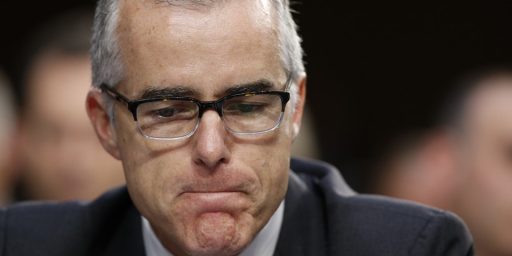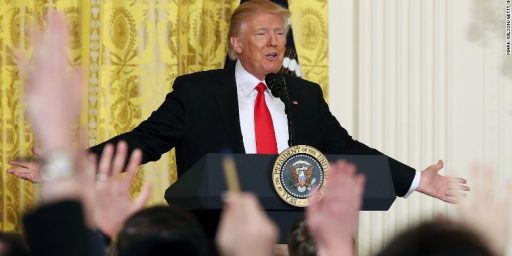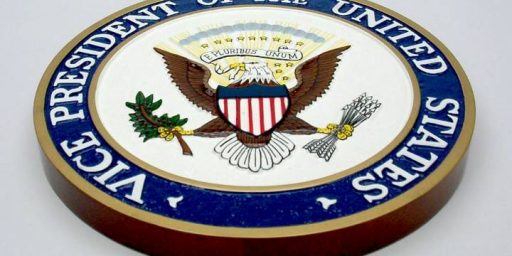Secret in the Line of Presidential Succession
Charles Babington has discovered an interesting bit of trivia: the identity of the Speaker Pro Tem–is a secret. Why’s that important? The Speaker of the House is 2nd in line to the Presidency behind only the Vice President.
House Speaker J. Dennis Hastert (R-Ill.) shows no sign of resigning over the Mark Foley-House page scandal. But the mere suggestion that he might do so raises an intriguing political and constitutional question: Who would replace him while Congress is in recess?
The answer, it appears, is on a piece of paper locked away in the House clerk’s office. In a little-noticed action taken nearly four years ago, the House amended its rules dealing with the “continuity of Congress” in emergencies and the succession of speakers. The rule, cited recently in Roll Call, directs the speaker to “deliver to the Clerk a list of Members in the order in which each shall act as Speaker pro tempore . . . in the case of a vacancy in the office of Speaker.”
Normally, “speaker pro tempore” is the title given for a few hours at a time to various members of the majority who preside over House sessions. But the rules revision made in January 2003, in response to worries about terrorist strikes that could wipe out large numbers of elected officials, appears to bestow upon a newly named replacement all the powers enjoyed by a full-time speaker elected by his peers.
[…]
One thing is certain: The identity of the speaker-in-waiting is a closely held secret. Hastert’s office declined to discuss the matter, citing security concerns, and the clerk’s office confirmed only that Hastert’s list is not made public.
Given that the 25th Amendment provides for replacement in case of a vacancy in the vice presidency, the only way a Speaker could ascend to the presidency would be in some kind of attack or natural disaster that killed the president and vice president in rapid succession. And maybe not even then:
Perhaps the biggest question, some lawyers say, is whether a House speaker — full time or pro tempore — can assume and keep the presidency under any circumstance. A statute, not the Constitution, lists the speaker’s place in the line succession.
A case can be made that no one in Congress qualifies as an “officer” eligible to assume the presidency under Article II of the Constitution, said Neil Kinkopf, a professor of law at Georgia State University. The question may never be settled, he said, because the Supreme Court would take it up only if a speaker became president and someone challenged the action in court.
The Presidential Succession Act establishes the order beyond the Constitutional succession of the vice president with the Speaker of the House, President pro tempore of the Senate, and then the cabinet officers in order of the founding of the departments. As this InfoPlease listing shows, though, there are some quirks in this system even aside from the Constitutional concerns raised by Kinkopf. For example, there has been a bill submitted attempting to elevate the Homeland Security Secretary to the 8th spot. And several cabinet officers are Constitutionally ineligible to serve as President because they were not born in the United States.






I’m puzzled. The statute speaks of no “Speaker Pro Tempore.” If the Speaker’s office is vacant, etc., it seems the succession would move right on down.
C-Span’s Capitol Questions says:
Anderson:
That was my initial thought, too, but the scenario here is that Hastert resigned or otherwise vacated office before the new Congress convened and elected a successor. At that point, the SPT would be elevated to Speaker. If a catastrophe happened before a new election, he’d be 2nd in line to the presidency.
It’s incredibly far-fetched but at least mildly interesting.
I know the folks in the Command Centers (to include NAOC sort of) of US Strategic Command are possibly pulling their hair out right now because they are the ones that track “Continuity of Government” the most closely due to the release of nuclear weapons issues. They have a legal responsibility to track this, while the NMCC is supposedly just a conduit for communications.
However, if General Cartwright (CINCSTRAT) has not been told this “secret” then the Clerk is violating numerous “Continuity of Government” laws dating back to the 1950s, with significant penalties. I certainly hope this info has been released to STRATCOM.
Why do cabinet officials get any place in line? Nobody voted for them…I would rather see a seniority based choice from the house or senate.
Matt,
But nobody outside their district/state voted for anyone in Congress. For that matter, no one would have necessarily voted for a replacement VP under the 25th Amendment. Gerald Ford, who replaced Spiro Agnew as VP and then Richard Nixon as president, happened to be a member of the House of Representatives but there’s no requirement it be an elected official.
Cabinet officers are at least appointed by an elected president and then confirmed by the Senate. That’s not so bad in an emergency.